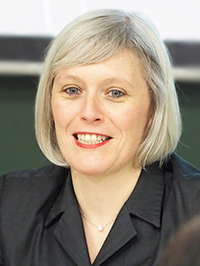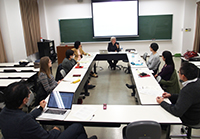Seminar “Finding your Place: Reflections on Doing Fieldwork on Japanese New Religions”
The IGS Seminar held on December 14, 2016, featured a lecture by Dr Erica Baffelli (Specially Appointed Professor, IGS / Senior Lecturer, The University of Manchester) entitled ‘Finding Your Place: Reflections on Doing Fieldwork on Japanese New Religions’. Baffelli’s area of research is Japanese New Religions, especially organisations established in 1970s that became large and well known by the 1990s, such as Kofuku-no-Kagaku (Happy Science), Agon Shu and Aum Shinrikyo. Her main research method is fieldwork, which is a major data collection method in anthropology and ethnography. In her lecture, she talked about the issues of the position of the researcher and reflection in fieldwork, based on her own research experience.
The issues of reflection and positioning have been being discussed since the 1970s. Researchers in the human sciences inevitably face them and must think and keep thinking about them throughout their academic life. Their importance is not limited to anthropology and ethnography but is shared with research in other departments, such as sociology and development studies.
Fieldwork, composed of interviews and participant observation, includes the possibility that the researcher’s individuality, gender, sexuality and life experience will affect the research process. For example, Dr Baffelli mentioned that finding shared experience, such as music preference, area of residence and child-bearing and child-rearing experience, with her interviewees and informants helped start conversation several times in her fieldwork. Particularly with female ex-Aum members, having the same gender might have helped her become recognised as comfortable company to speak with. Developing a certain degree of familiarity and closeness is a key factor to conducting good interviews.
At the same time, keeping distance from research subjects is important, although it may bring about obstacles to your fieldwork. A religious organisation you are studying might demand that you become a member to conduct a participant observation. The organisation might try to utilise your voice and status as researcher as a proof of their status. Religious organisations and members tend to keep secrets that they never share with non-members. These situations indicate limits in fieldwork. When you face them, it is important to define your purpose and position as researcher and then decide according to those factors.
In this way, in the field, researchers must often ask themselves, ‘Who am I?’ and ‘What part of me is being used for my work and research?’ An idea widely shared among researchers is that researchers are not invisible existences. The influence of the researchers’ individuality in their fieldwork cannot be ignored. As we see, the gender of a female researcher may encourage an interviewee’s participation. On the other hand, it can also cause physical harm in a violent situation. This means that the researchers’ individuality is reflected in their research.
As meeting people and developing relationships with them are essential for fieldwork, there is a risk of intervention by the researcher in the field society and the relationships of people there. Researchers are free to leave the field anytime but research subjects are not. Researchers must pay careful attention to their influence on the subject society. Together with that the encounter with the research subjects reflects on researchers’ self-recognition, reflection in fieldwork occurs interactively between the researchers and the researched.
The power relationship between the researchers and the researched is not equal. Fieldwork is a cooperation between them, but writing up the outcome is likely to be handled by the researcher. Whose voice appears in the writing represents a power relationship between them and the researcher.
The discussion of positioning began from the recognition that western-centric stereotyping must be avoided in academic research. In recent years, many anthropologists have stated in their papers from what categorical position they are writing the papers. Some researchers, however, criticise this practice, because it may lead the risk of self-stereotyping by the researcher, who then boxes him- or herself into a narrow category based on race, class and cultural background. Self-reflection in the field enforces the self-recognition of their identity on the researchers. Placing themselves into existing categories buries their individuality, and comparing themselves and the researched from a categorical point of view may reproduce stereotyping towards others.
Discussing her research project and the issue of positioning, Baffelli noted that, unlike many other ethnographers, she never shared values with her interviewees. On the other hand, she stressed that what she was trying to do was seeing each of them as a unique individual. She researches organisations and her interviewees belong to the same religious organisations. Members of a religious organisation share the same values, worldview and religious leaders. At the same time, the members are not uniform, and there is a diversity among them. Listening to their narratives, occasionally feeling discomfort, she recognises that there is something close to her among them. For example, relatively young ex-Aum members belong to her generation. Maybe they went to school at the same time, enjoyed the same popular culture, read the same books and had similar thoughts. At this point, she quoted a Judith Butler, who said in Giving an Account of Oneself that without developing a certain closeness and relationship, you could not make ethical judgements of others, even if you wished to condemn them.
In the first part of her lecture, Baffelli explained that fieldwork is an encounter with others, but it is not merely seeing each other. The researchers and the researched develop a relationship through several steps of the interview. Interviews and research are composed of narrating and listening to particular experiences and memories, interactive reflections and data analyses and examination after fieldwork. This may indicate that the positioning of the researchers cannot be set as a fixed point from the beginning to the end but configured through various interactions in fieldwork. A study is also a way of creating a judgement of others, and the appreciation of such relationship-building mechanisms and techniques may lead you to a deeper understanding of human nature.
In addition, Baffelli spoke of her media ethnography research, as well as a new project on ‘Women, Religion and Violence’. Her narrative clearly showed her enthusiasm for research and her professionalism as an academic researcher.
Kumi Yoshihara (Project Research Fellow, IGS)
 Erica Baffelli
Erica Baffelli


